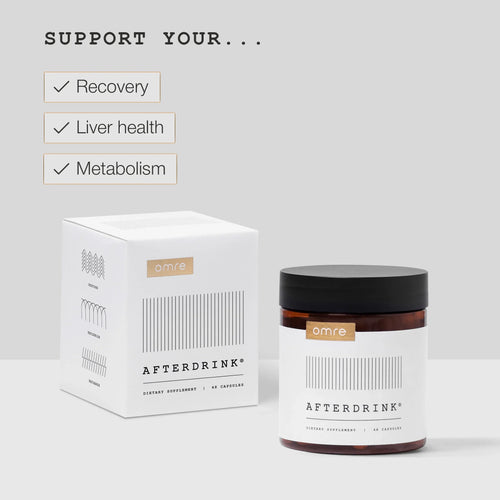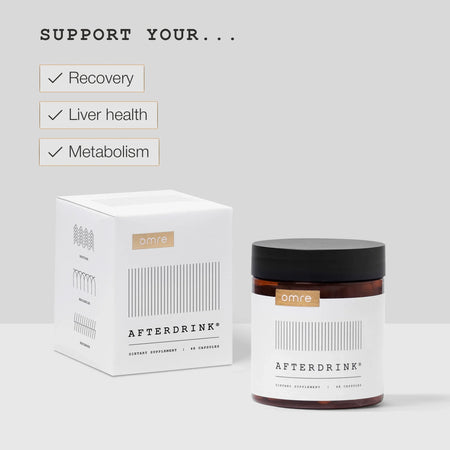Table of Contents
- DIFFERENCE BETWEEN WINE ALLERGY AND WINE INTOLERANCE
- WHY DOES WINE CONTAIN HISTAMINE?
- WHAT DOES HISTAMINE DO?
- OTHER COMMON WINE ALLERGENS
- WHAT ARE THE SYMPTOMS OF WINE HISTAMINE INTOLERANCE?
- CAN YOU BE ALLERGIC TO HISTAMINES IN WINE?
- ALCOHOL INTOLERANCE VS. HISTAMINE INTOLERANCE
- WINE HISTAMINE AND HANGOVERS
- WHAT WINE HAS THE MOST HISTAMINE?
- LOW HISTAMINE WINE
- CAN YOU REMOVE HISTAMINE FROM WINE?
- WILL ANTIHISTAMINES HELP?
- WHEN TO SEEK MEDICAL ADVICE
- HISTAMINE IN WINE – FINAL WORDS
If you've landed on this article, drinking wine gives you a bad reaction.
Well, you're not alone. Many people experience headaches, flushing, and bad hangovers when they drink wine.
Could histamine be the cause?
Histamine is known for its association with allergic reactions. When it comes into contact with something it's allergic to, it causes swollen lips, hives, and facial flushing.
Histamine is naturally produced in fermented foods and drinks. Certain types of wine have an exceptionally high concentration of histamine.
In this article, we're going to take a detailed look at the role of histamine and whether it could be one of the reasons why you may react badly to wine.
Afterdrink®
A supercharged antioxidant designed to support recovery, made from the very best, research-backed ingredients on the market.*
DIFFERENCE BETWEEN WINE ALLERGY AND WINE INTOLERANCE
Before we dive into histamines, it's important to distinguish between wine allergy and wine intolerance. A wine allergy involves an immediate immune response to specific allergens in wine, such as the proteins from grapes, yeasts, or additives like sulfites (used as preservatives). This can result in symptoms like hives, swelling, and even anaphylaxis.
On the other hand, wine intolerance may or may not involve the immune system. It often stems from enzyme deficiencies or sensitivity to compounds like sulfites or histamines, leading to delayed reactions such as headaches, flushing, and digestive issues. Understanding this difference is crucial to effectively addressing your specific response to wine.
WHY DOES WINE CONTAIN HISTAMINE?
Wine contains histamine because it is a fermented product. During the fermentation process, bacteria involved in breaking down grapes produce histamine. Similar to wine, other fermented foods like cheese, sauerkraut, and processed meats naturally have high histamine levels. (1)
WHAT DOES HISTAMINE DO?
Histamine is a chemical message produced by specific cell types, including mast cells (white blood cells), platelets, and Enterochromaffin cells (in your stomach lining).
When histamine is released, it binds to one of four histamine receptors. It causes smooth muscle contraction, dilation of blood vessels, mucous secretion in the stomach lining, and a drop in blood pressure, to name a few.
In normal circumstances, once histamine has done what it needs to do, your body breaks it down.
However, some people may be unable to help break down histamine as efficiently or are particularly sensitive to small amounts. In this case, they may develop symptoms of wine histamine intolerance. (2)
Therefore, drinking wine that contains histamine can cause a reaction that can mimic an allergy.
OTHER COMMON WINE ALLERGENS
Histamine isn't the only compound in wine that can cause reactions. Other common wine allergens include sulfites, tannins (polyphenols that give the wine its structure), proteins from grapes and yeasts, egg whites, milk proteins, and fish derivatives.
These allergens can trigger symptoms ranging from mild discomfort, such as headaches or rashes, to severe allergic responses like anaphylaxis. If you experience symptoms like these, it may be due to one of these other compounds, not just histamine.
WHAT ARE THE SYMPTOMS OF WINE HISTAMINE INTOLERANCE?
The symptoms of wine histamine intolerance include:
- Diarrhea
- Headache
- Blocked nose
- Wheeze
- Low blood pressure
- Hives / itchy skin
- Flushing (going red in the cheeks)
If you're someone who gets these symptoms after drinking a small amount of wine, it could be a sign of intolerance.
Diagnosing histamine intolerance can be challenging. It often involves an elimination diet, where you avoid high-histamine foods and beverages to see if your symptoms improve.
Keeping a food diary can also help you identify triggers. Sometimes, your doctor may suggest testing you for DAO (diamine oxidase) enzyme levels or performing a histamine skin prick test to confirm the diagnosis.
Speaking to your doctor is essential because these symptoms are not specific to wine histamine intolerance — several other conditions can cause similar symptoms.
CAN YOU BE ALLERGIC TO HISTAMINES IN WINE?
You cannot be allergic to histamines in wine because histamine is a natural chemical messenger produced by your body. However, some individuals are sensitive to histamine, and even small amounts can trigger symptoms. This is classified as histamine intolerance rather than an allergy.
An allergy involves an immune response to foreign substances like pollen or nut proteins, known as allergens. Histamine, however, is a natural chemical messenger your body produces, so it cannot be classified as an allergen, and you can’t be "allergic" to it.
Some individuals, however, are sensitive to histamine and may experience symptoms like flushing, headaches, or digestive discomfort.
This condition, known as histamine intolerance, occurs when the body struggles to break down histamine efficiently, making wine and other histamine-rich foods problematic.
ALCOHOL INTOLERANCE VS. HISTAMINE INTOLERANCE
The main difference between alcohol intolerance and histamine intolerance is the cause of the reaction. Alcohol intolerance results from the body’s inability to break down alcohol, often due to an enzyme deficiency. Histamine intolerance occurs when the body struggles to break down histamine, a compound found in many fermented foods and beverages, including alcohol.
Afterdrink®
A supercharged antioxidant designed to support recovery, made from the very best, research-backed ingredients on the market.*
WINE HISTAMINE AND HANGOVERS
You may have noticed that many of the symptoms of histamine intolerance mentioned above overlap with typical hangover symptoms.
This is because histamine exacerbates wine hangovers. Wine also contains several other compounds, such as sulfites, esters, and tannins, which give it its distinctive aroma and taste.
These compounds are collectively called congeners.
Research has shown that congeners in alcohol are a significant contributing factor to hangover symptoms. (2)
In addition, several studies have shown that histamine, in particular, is one of the possible causes of wine headaches and migraine. (3)
The theory is that histamine dilates blood vessels in the brain, causing increased pressure and triggering a cascade of events that ultimately lead to inflammation and pain.
One thing's for sure: histamine doesn't help with hangover symptoms. It is likely one of the reasons why some feel that wine hangovers are worse than other drinks.
WHAT WINE HAS THE MOST HISTAMINE?
Red wines generally have the highest histamine content compared to white and rosé wines due to differences in production and aging processes. However, histamine levels can vary widely even within the same type of wine, depending on factors like crop health, fermenting yeasts, and bacterial strains.
A research group in Australia tested 100 different types of red wine to measure their histamine levels and determine which had the most. (4)
Interestingly, they discovered that histamine concentrations varied greatly, even within the same type of wine. For example, one Shiraz might have significantly more histamine than another Shiraz from a different producer.
The researchers concluded that factors like crop health, the specific strains of fermenting yeasts, and the bacteria involved in fermentation play a much bigger role in histamine content than the type of wine itself.
On the other hand, white and rosé wines naturally contain less histamine than red wines because they are made differently and don’t go through the same aging process.
LOW HISTAMINE WINE
Low histamine wine refers to wines that contain reduced levels of histamine, although there is currently no standard definition or predefined concentration. White and rosé wines typically have lower histamine levels than red wines due to differences in production and aging processes.
CAN YOU REMOVE HISTAMINE FROM WINE?
No, you cannot completely remove histamine from wine. While some products claim to filter out histamine, there is no scientific evidence to confirm their effectiveness, as histamine molecules are too small to be reliably removed by traditional wine filters.
Many wine filters are designed to remove impurities like sulfites and larger sediments, but histamine is a much smaller molecule that cannot be eliminated through these methods.
Some products on the market claim to target histamine specifically with finer filters, but as of now, no published research supports their ability to effectively remove histamine from wine.
For individuals sensitive to histamine, it’s best to choose white or rosé wines, which naturally contain lower histamine levels, or to consult with a healthcare professional for guidance.
WILL ANTIHISTAMINES HELP?
Antihistamines like Zyrtec and Pepcid work by blocking certain types of histamine receptors. Taking antihistamines if you have an intolerance could potentially help. However, it's not advisable as it could mask some of your symptoms and make you feel more unwell in the long run.
It's also worth noting that certain medications, such as muscle relaxants, opioids, anti-inflammatory drugs, and some antibiotics, can interfere with your body's process for breaking down histamines or can even directly increase histamine levels. This can exacerbate any symptoms of histamine intolerance you're experiencing and make it even more challenging to manage your symptoms.
While antihistamines might provide temporary relief, they are not a long-term solution, and avoiding wine is often the best course of action if you have a histamine intolerance.
The best way to avoid symptoms of wine histamine intolerance is to avoid drinking wine in the first place. Trying to medicate it could cause more long-term damage.
WHEN TO SEEK MEDICAL ADVICE
In rare cases, experiencing severe pain after drinking alcohol can be a sign you have a more serious underlying condition, such as Hodgkin's lymphoma. Additionally, migraines triggered by alcohol may indicate an immune system reaction involving histamines. Suppose you experience intense or unusual symptoms after drinking alcohol. In that case, seeking medical advice to rule out more severe conditions is crucial.
HISTAMINE IN WINE – FINAL WORDS
This concludes our discussion of histamines in wine and their potential problems for some people.
We've explained why wine contains histamine and the signs and symptoms of histamine intolerance. It's a well-known reaction to wine, and if you suffer from adverse symptoms from small amounts of wine, it's advisable to avoid it.
Red wines generally have a much higher concentration of histamine. They are more likely to give you symptoms if you're sensitive. Therefore, switching to white wine or rose might help.
To reduce a wine hangover, check our article on wine hangover cures.





